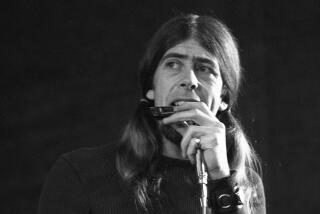Jackie McLean, 73; Saxophone Great Played With Jazz Legends
- Share via
Jackie McLean’s introduction as a player to Birdland in New York City would become a legendary story in jazz. A protege of both pianist Bud Powell and saxophonist Charlie Parker, McLean was building a solid reputation in small bands in Harlem as an emerging force on saxophone.
He was not yet 21, however, and was plenty nervous when he showed up at Birdland one night, not to listen to the great musicians that came through town -- as he often had over the years -- but to play.
He walked into the club, found the band’s leader, trumpeter Miles Davis, and introduced himself. And then McLean discovered that the rest of the group that night consisted of Art Blakey on drums, Percy Heath on bass, Horace Silver on piano and Gene Ammons on tenor saxophone. All of them would become legends of jazz.
“Miles pushed me out to play the first solo,” McLean recalled in an interview with the Hartford Courant some years ago. About eight bars into the solo, McLean had an overwhelming feeling, and it wasn’t good. He put down his horn and dashed backstage, where he found a convenient garbage can, leaned his face into it and let go. As he pulled his head out, the owner of the club, who was looking on in amazement, threw McLean a towel and said, “Get the hell back out there!”
“So I wiped my mouth,” McLean said, and headed back on stage.
The rest of the players “were all just standing there,” he said. “It was like time stopped, like a dream sequence. Nobody was playing, just the rhythm section. I went back out and finished playing my solo.”
McLean said the audience gave him a wild ovation. “It was like they thought, ‘Hey, here’s a guy who throws up and plays.’ ”
From that mixed beginning in 1951, McLean, who died Friday at his home in Hartford, Conn., at 73, built a career as one of the great saxophonists, composers and educators in jazz. He had been in failing health for some time, family members said, but they did not announce the cause of death.
The same year that he played with Davis at Birdland, he joined the great trumpeter in the recording studio for an album called “Dig.” The title came from an original composition by McLean, who was on his way to building a national reputation.
Over the next two decades, McLean produced an extensive body of recordings for the Prestige, New Jazz and Blue Note labels. The Blue Note recordings, including the albums “Jackie’s Bag,” “A Fickle Sonance” and “Let Freedom Ring,” helped define the pioneering sound of the label in the early 1960s.
He also worked with most of the A-list figures in jazz during that period, including bassist Charles Mingus and Art Blakey’s Jazz Messengers.
McLean’s sound was distinctively his own: slightly sharp with a great intensity. He was one of the few bebop-oriented players from the early ‘50s to explore the improvisational free jazz movement of the early ‘60s. A New York Times critic once said McLean “expanded the language of bebop with his own musical vocabulary. He produced a searing tone and was one of jazz’s most expansive innovators.”
McLean told writer Zan Stewart that the most distinctive quality of his playing was his tone. “It’s like an alto, but it’s really a tenor coming from the inside of me,” he said. “If I hadn’t heard Bird [Charlie Parker], I would have switched to tenor, because I was in love with Dexter [Gordon], Ben Webster, Lester Young and the others.”
By the late 1960s, straight-ahead jazz was in a downward cycle and so was McLean, who for several years had been dealing with a heroin addiction that he once told Chicago Tribune critic Howard Reich “happened before I knew it.”
McLean kicked the drugs and devoted his energies to other pursuits. He visited prisons to counsel drug users and moved to Hartford, where in the late 1960s he developed what is now the Jackie McLean Institute of Jazz at the University of Hartford’s Hartt College of Music. It was one of the first strong jazz programs in the country. Throughout the rest of his life, his main focus would be on jazz education.
In the 1980s and ‘90s, McLean returned to a more active performing schedule that included playing with his son Rene, also a saxophonist. In addition to his wife and son, McLean is survived by daughter Melonae; another son, Vernone; five grandchildren; and several great-grandchildren.
Born in New York City, McLean grew up in Harlem, where his childhood friends included such future jazz stars as saxophonist Sonny Rollins, pianist Kenny Drew and drummer Art Taylor.
McLean recounted much of his life in music as one of the interview subjects in Ken Burns’ 10-part PBS documentary series “Jazz,” which aired in 2001. That year the musician was also recognized as an American Jazz Master by the National Endowment for the Arts.
More to Read
Sign up for The Wild
We’ll help you find the best places to hike, bike and run, as well as the perfect silent spots for meditation and yoga.
You may occasionally receive promotional content from the Los Angeles Times.






